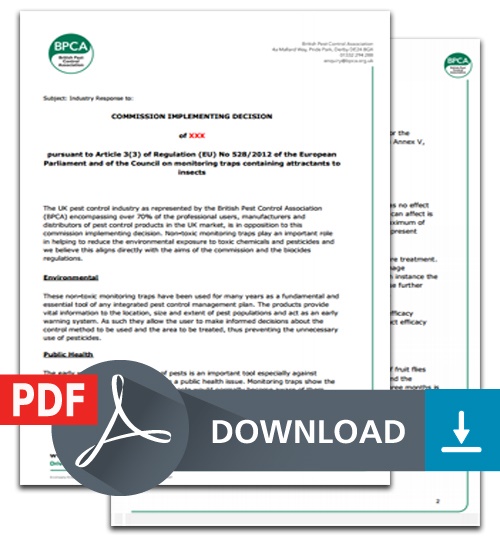 We recently shared the news that the European Commission is proposing to class monitoring traps containing attractants as biocides. These include moth pheromone traps, cockroach traps and fruit fly traps.
We recently shared the news that the European Commission is proposing to class monitoring traps containing attractants as biocides. These include moth pheromone traps, cockroach traps and fruit fly traps.
Insect monitoring traps within the scope of the biocidal products regulation would create a precedent for all monitoring devices using attractants, for any other pest or vector species or group which risk to be considered as biocidal products. BPCA has responded to this proposal to reject it in the strongest terms (see attached response).
BPCA has published an industry statement, however, the argument to cancel this initiative would be strengthened if BPCA Members including Servicing Companies, and also your clients whose sites utilise such monitoring traps, were to write to the Commission to express their views (in addition).
We do not want a set of duplicate responses – these would be counted as a single view by the Commission. What we need is for you to explain who you are, why you use these products, and the likely impact on your business, your clients, and the environment if such traps became classed as biocides.
You might want to consider the following:
- Tell them about your company – size, number of people employed, what you do, number of sites, etc. (if applicable)
- How you use monitoring traps: are they necessary for you to make informed decisions about control measures?
- How often do you use these traps?
- Do the traps help you identify vectors of disease?
- Do insect traps containing attractants capture all insects, or a sub-section of the population?
- Are the flying insects the ones causing the damage?
- Do you use them for control, or just to detect, identify, locate and track pests?
- What do these traps do for your business?
- What is their impact on your use of biocides, and would it make any difference if you no longer had them available?
Please send your email to Dr Alfonso Las Heras, European Commission
email alfonso.las-heras@ec.europa.eu
please copy BPCA (simon@bpca.org.uk) in on your response.
You should respond immediately, as this decision is about to be made.
Download document
 Simon Forrester
Simon Forrester
Chief Executive
28 April 2017 | BPCA.org.uk
Source: BPCA Newsflash